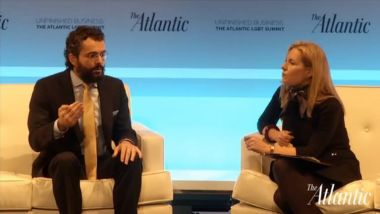Admitting you're a conservative evangelical Christian is harder than coming out as gay, says author

Nowadays it's harder to admit that you are a conservative evangelical Christian than come out as a gay, lesbian or transgender.
This is the belief of conservative author Ryan Anderson who said it's more difficult now to say that you support traditional marriage than to say you support gay union.
At an LGBT summit hosted by The Atlantic on Thursday last week, Anderson defended the rights of small business owners who don't want to serve gay weddings based on their religious beliefs, according to WND.
In an interview with The Atlantic, Anderson offered his advice on how Americans should walk the fine line between granting LGBTs protection following the legalisation of same-sex marriage last June and respecting the religious freedom of those who are against such marriage.
"What I would suggest, the protections here would be market competition. Already 89 percent of Fortune 500 companies have voluntarily enacted non-discrimination statutes on the basis of sexual orientation. This is working its way out on a voluntary basis," he said.
Anderson said business owners have the right to run their business based on their religious beliefs. He said the federal government does not need to have the national non-discrimination act that would force businesses to serve same-sex couples and their weddings as there are many businesses that do so already.
"Rather than balancing of rights, I say everyone should have equal rights. The baker is free to bake cakes in accordance with her beliefs and same-sex couples are free to get whatever cake they want from whatever bakery wants to bake it," he said.
Anderson was prevented from speaking at an event because the hotel hosting it disagreed with his defence of traditional marriage.
He said he agreed with that decision.
"They should be free to run their hotel in accordance with that belief. My right to speech, free speech right, doesn't mean anyone else has to give me a podium or write a speech for me," he said.
When asked if the issues confronting the LGBT community today are similar to the segregation faced by African-Americans in the 1960s, Anderson said, "I think that analogy is historically inaccurate."
"I think it is offensive to many black people. I don't think the situation of a gay or a lesbian in the United States today is remotely similar. Being African-American in the South in the 1960s is radically different than being gay, lesbian, bisexual, transgender in the United States today," he said.











